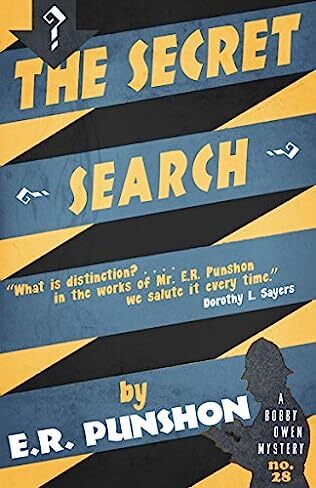The Secret Search

A review of The Secret Search by E R Punshon – 230706
Here’s a mystery before we start. The cover of the reissued edition of this book by the excellent Dean Street Press shows it to be the twenty-eighth in Punshon’s Bobby Owen series while the usually reliable Fantastic Fiction shows it as the twenty-ninth, appearing after The Golden Dagger, both of which were originally published in 1951. It matters not a jot for the appreciation of the book, only a confusion that is a tad irksome for those who like to read a series in chronological order.
There is a much grittier, darker side to Punshon’s post-Second World War stories, and The Secret Search follows this trend, as we find ourselves hurled into a feud between two gangs, one led by Cy King whose air of invincibility had been punctured by Owen’s sleuthing previously and the other by Tidy Garden. The denouement, which is the highlight of the book, results in the inevitable violent conclusion to the rivalry, justice of a sort being done, and a happy ending for at least two of the leading characters.
I found it one of Punshon’s least successful novels, mainly because there was nothing tangible for the sleuth to get his teeth into. It was all suspicions that things were not right, that circumstances were leading up to a crime being committed, possibly even murder, and even when Commander Owen of the Yard’s acute nose for trouble proves spot on, there is nary a piece of evidence that would stand up to the forensic scrutiny of a defence barrister. At one point we even venture into the world of Extra Sensory Perception and codes, the relevance and importance of Me OK is never really satisfactorily explained. The secret search of the title is the hunt for a person, whose disappearance is reported by Ted Wyllie whose motives and role in the plot only become clear at the end.
It is also a tale of impersonation. Owen is indignant that one of Cy King’s gang impersonates himself in order to gain access to premises and case the joint, as they say. The plot revolves around the impersonation of Elizabeth, the niece of a rich old man, Mr Smith, and the real niece’s disappearance. At one point in the story there are three Elizabeth Smiths involved. And is it fanciful to think that Bobby Owen saw his young self in the form of a lowly police constable, Fred Ford, whose initiative caught his attention and whom he transferred to CID pronto?
While the plot seems complicated it boils down to a plan by the gangsters to get hold of an old man’s estate worth around £200,000 by introducing him to his (fake) long-lost niece just returned from Canada in the hope that he will leave his money to her and, of course, accelerating his demise. He is found dead in his bathtub. Whether any hardened gangster would have thought that the turn of events needed to make the plot come to fruition was worth the hassle is doubtful, especially as the arrival of the real niece, as happens, could easily scupper the plans. Olive, the ever-faithful housewife and font of sage advice, makes more of an appearance in this one and I always enjoy her contributions and her marked exasperation at her husband’s failure to see the wood for the trees.
It was interesting to see Punshon took inspiration from a passage from Xenophon’s Anabasis for the psychotic drug that kept the real niece quiet, mad honey made from honey collected from the summer blooming Datura which is commonly found in the hedgerows near Blogger Towers. Despite the odd point of interest, though, the book did not grab me as Punshon’s normally do and its pace, funereal at times, almost came to a halt at the midpoint. Whether it is number twenty-eight or 29, I am happy to move on to number thirty.



